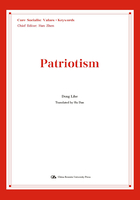
1. Patriotism in Ancient China
Situated in the eastern part of the Euro-Asian Continent, China covers a large area. It stretches from the Pamir Plateau in the west to the islands on the west coast of the Pacific Ocean, and from the deserts in the north to the seas in southeast and the mountains in southwest. Elevation descends gradually from west to east. The western part of China is the Tibet Plateau with an average elevation of over 4,000 meters. East of it is the Yunnan-Guizhou Plateau, the Yellow Earth Plateau and the Inner-Mongolia Plateau with an elevation of about 1,000 to 2,000 meters. Further east is mountainous areas below 1,000 meters of elevation, and the plains less than 200 meters. This is the motherland of the Chinese nationality. Our ancestors used to believe that this was the only land that human beings could have a happy existence, so they called it“Land under the Heaven”. Because of being surrounded by the sea, this land was also called“Within the Sea”. As early as five thousand years ago, the Chinese nation began to evolve and develop in this area, and a magnificent civilization thus emerged. The evolution and development of the concept of the Chinese nationality in ancient times can be divided into two periods:from pre-historical times to the Qin and Han dynasties, and from the Qin and Han dynasties to the year 1840. The concept of Chinese patriotism had distinct features in the phase of the ancient times.
As early as in the Neolithic Age between 6000 B. C. and 2000 B. C. , the Chinese civilization began to appear in the middle reaches of the Yellow River and the middle and lower reaches of the Yangtze River. Different cultures competed and intermingled with each other and began the process of integration. In the process of wars waged by the big tribal leaders, such as Yan, Huang, Yao, Shun, Yu, etc. , the different tribes confronted and then merged with each other. Thus the early formation of the Han nationality began. During the Xia, Shang and Zhou dynasties, through merging and integration, the Han nationality became stronger, and finally established itself as a single nationality. During the era of the Warring States Period, through large-scale ethnic migration and merging, and by absorbing numerous new elements of ethnic groups and cultures, the Han nationality further strengthened its position as the major ethnic in this land. Thus, the principal nationality of Han finally came into being. During the three dynasties of the Xia, Shang and Zhou, the Chinese culture formed its distinct features. Upon the Warring States Period, there emerged a time of major ideological debates accompanied by a period of cultural prosperity for the first time in the Chinese history, which was also due to population migration and cultural exchanges between different ethnic groups and through competition among the states. That was a period of free contention among various ideological schools, of which the Confucius School was typically one of the largest. Talents mushroomed and a period of cultural prosperity appeared in the East.